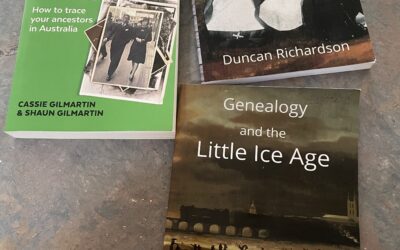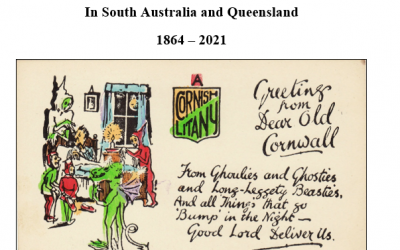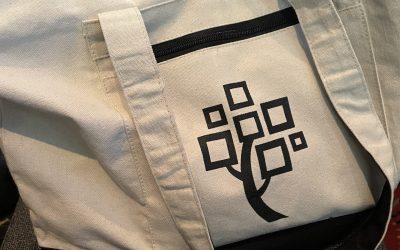 For National Family History Month I compiled a list of 31 activities for researchers and 31 activities for genealogy/family history societies to think about during August. Read about the first 15 activities for societies here and below is the final 16.
For National Family History Month I compiled a list of 31 activities for researchers and 31 activities for genealogy/family history societies to think about during August. Read about the first 15 activities for societies here and below is the final 16.
16 Convert your card indexes (if any) to a computer database for easier access (not to mention a back up copy)
Rekeying data can be a time consuming and boring task but it is worthwhile as it makes the data much more easier to access. Also it’s a once only task and you can then have backup copies stored off site. Call for a volunteer now!
17 Does your society newsletter or journal need a new look
Most societies have a change of look when they get a new editor or there is some other push to review the journal or newsletter. Have you ever thought of entering your society’s publication for the Nick Vine Hall awards? AFFHO presents these every year during NFHM so think about entering in 2014.
18 Does your library need a new layout (or tidy up)
Most societies do a shelf check each year to identify any missing items or items that have been misfiled. Donated items always need to find a home and computer equipment always needs upgrading. Is there a better way of organising your space?
19 Contact your local newspaper for publicity on society meetings and any special events
How successful are you at doing this? The local papers are usually very good for getting in notices of meetings but I also find that if you put a few paragraphs together with a photograph they may also be interested in publishing that. It’s a great way to highlight a visiting speaker or a workshop you may be holding not to mention your NFHM activities.
20 Hold a new members session at the library
New members often feel a bit lost when visiting a society’s library so having an orientation session is good and once people are more comfortable finding their way around the library, they may even find time to do library duty. I always found when I did library duty that I learnt a lot from helping others with their own research and if it’s quiet, there is always time for your own research.
21 Have members bring a friend to the next meeting
This could be a great way to gain new members and to let others know what resources the society has to offer. Remember to make visitors feel welcome – sometimes we are so busy organising the meeting or catching up with friends we don’t see the newcomers.
22 Investigate what local events you could have a display at
Local shopping centres are an obvious place to have displays with lots of people passing by. What about your local newsagent who stocks genealogy magazines ? Are there any local heritage events or markets where you could promote your society to the general public.
23 Focus on attracting younger members
As someone who started researching genealogy in 1977 while in my early 20s, I’m conscious that societies need to attract younger people to ensure that societies continue to exist and be a place that helps people trace their families. That’s why we should be using social media tools to connect with younger (and not so young) researchers and we aren’t going to find them in nursing homes – so before you accept an offer to speak somewhere, think about will this bring new (younger) members into the society?
24 Have someone greet visitors or new members at each meeting
Many societies already do this but often I find these people are popular and everyone stops to talk to them and the newcomers get overlooked or sit down without making contact. I’ve even found that some visitors and new members think there are cliques that they can’t be part of and this is probably more common with younger people who turn up at meetings. So make sure everyone does feel welcome and that they want to come back again.
25 Consider doing something for the centenary of WW1 in 2014
This is an obvious activity for every society next year and it should also be possible to connect up with other projects in your area – look out for potential collaborative projects and follow up with the organisers.
26 Are the war memorials in your area transcribed? If not think about doing it and perhaps even adding information on those listed especially for WW1
Lots of these have already been done but check out your area and confirm what has been done or still needs to be done. Take photos as well as transcribing the names.
27 If you have a website how user friendly is it?
Do people find your website easy to use? What resources do you have online – have you thought about a members only area? Is your list of meetings up to date and are library opening times current? Review each page and take down out of date information.
28 Start a genealogy book reading club and get members discussing new resources
Book clubs are not for everyone but it is a way of getting members to learn about new publications and in today’s modern times, it could even be a website or an ebook. Of course it needs someone to coordinate the group so see if there is an interested person who would like to start one up. It could even be a virtual group!
29 Encourage members to write their stories for your journal, perhaps even a prize for the best story each year
Journal editors are often desperate for articles so try and encourage members to write their stories. Do you have a writing family history special interest group where they can learn tips and tricks as well as share their stories?
30 Look at what other societies are doing for more ideas
There are hundreds of genealogy and family history societies and they all do similar things but there are also differences depending on resources, local expertise and available volunteers. Survey at least three other societies to see what they do that you don’t do and consider introducing a new idea or two.
31 Plan to participate in NFHM 2014
Many of these 31 activities are not something that you can do quickly or even only do once. Many can be adapted into NFHM activities so start planning now and the NFHM web calendar will be available from 1 October 2013 for activities in 2014.





That’s a super set of ideas. We are attempting some of them at Ku-ring-gai Historical Society but I don’t know that we can manage the whole 31 all at once.
Your points on making new people feel welcome is so pertinent. I’m a member of a society where I gave a couple of talks and offered to help with technology but never got even a thank you email for my efforts or a response to my offer of help. Needless to say I don’t visit there too often.